Postpublished at 18:01
We are bringing this live page to a close, with many questions still unanswered about the deadliest stampede at the Hajj in 25 years.
You can follow all the latest developments by going to our story on the BBC News website.
More than 700 pilgrims are killed and a further 800 are wounded in a stampede at the Hajj pilgrimage
The stampede took place during a ritual where pilgrims throw stones at pillars representing Satan
More than 360 people died in the same area in a similar crush in 2006.
Two million pilgrims are in Mecca for the Hajj. Saudi Arabia has spent billions trying to improve facilities there.
Penny Spiller and Neil Arun
We are bringing this live page to a close, with many questions still unanswered about the deadliest stampede at the Hajj in 25 years.
You can follow all the latest developments by going to our story on the BBC News website.
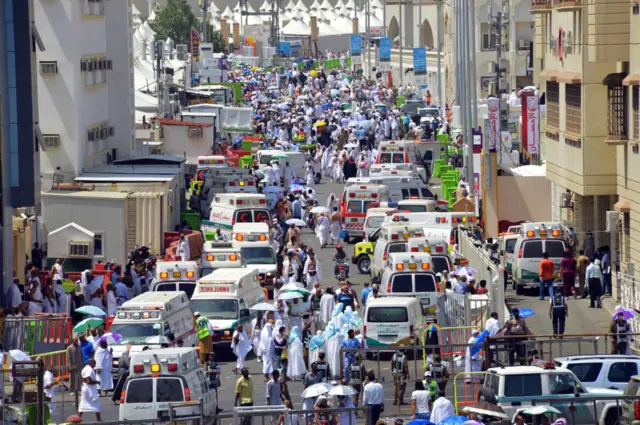 Image source, SPA
Image source, SPAMore than 220 ambulances and 4,000 rescue workers have been helping the injured, said Saudi officials
The Hajj attracts Muslim pilgrims from countries all over the world. Many relatives will be anxiously waiting for news of their loved ones as identification of the dead and wounded continues. This is what we know so far:
While a Saudi minister has blamed the tragedy on pilgrims' failure to obey instructions, several witnesses have accused the authorities over the disaster. Yusuf Ibrahim Yakasai, of the BBC's Hausa Service, was close to the site of the incident and gave this account of what an eyewitness told him:
Quote MessageA witness who escaped the stampede said what actually happened was that the Saudi security at the scene blocked one of roads to the Jamarat (stoning the devil)... This happened as thousands of pilgrims from different countries like Iran, Cameroon, Ghana and Niger were going to the Jamarat. Therefore as those who finished stoning the devil were coming back on the same route, they met those heading to the place. There was a kind of collision between the two groups moving in opposite directions on the same road. Those in the middle were the most affected.
Several witnesses have been describing what happened.
Abdullah Lotfy, a 44-year-old Egyptian, told the Associated Press: "I saw someone trip over someone in a wheelchair and several people tripping over him. People were climbing over one another just to breathe."
He said "there was no preparation" on the part of Saudi authorities.
Ismail Hamba, 58, from Nigeria, recalled falling down and then being trampled. "It was really, really terrible," he said.
The US has issued a statement on the stampede at the Hajj.
Quote MessageThe United States expresses its deepest condolences to the families of the hundreds of Hajj pilgrims killed and hundreds more injured in the heartbreaking stampede in Mina, Kingdom of Saudi Arabia. Our thoughts are with them and the more than two million people undertaking the Hajj this year. As Muslims around the world continue to celebrate Eid al-Adha, we join you in mourning the tragic loss of these faithful pilgrims.
Ned Price, US National Security Council spokesperson
We have more from the BBC's Bashir Sa'ad Abdullahi who is at the Hajj. He told the World Service that he had passed through the area moments before the crush.
Survivors, he said, had told him: "There was a crush between those who were going in to stone the wall... and those who were coming out.
"People were pushing in and pushing out and that led to the death of hundreds of people and many more injured."
He said that while most pilgrims were obeying the rules on how to conduct themselves, "there are a few pilgrims who are not orderly in their conduct."
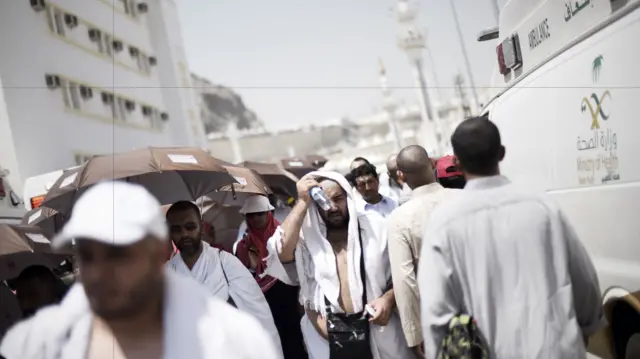 Image source, AFP
Image source, AFPPilgrims file past ambulances picking up the injured
The Hajj is the fifth and final pillar of Islam. It is the journey that every able-bodied adult Muslim must undertake at least once in their lives if they can afford it.
The five-day pilgrimage occurs in the month of Dhu al-Hijja - the 12th and final month of the Islamic lunar calendar.
An estimated two million Muslims have flocked to Mecca for this year's pilgrimage.
For more numbers involved in this year's Hajj, watch this video.
The exact cause of the stampede is not yet known - but officials have begun trading blame.
The Saudi health minister, Khaled al-Falih, accused worshippers of "not following" instructions.
Iran, Saudi Arabia's biggest regional rival, has meanwhile accused the Saudis of "mismanagement".
Saeed Ohadi, the head of Iran's Hajj organisation, told state TV that the closure of a road may have caused the crush.
At least 47 Iranians died in the stampede, according to Iran's state news agency Irna.
The BBC's Bashir Sa'ad Abdullahi sent this description of the scene after the stampede:
Quote MessageWhere I’m standing, here in the centre of Mina city, I can see dead bodies wrapped in white cloth. Police have barricaded the area so I couldn’t count the dead bodies, but dead bodies stretch as far as my eyes can see. And surrounding the area some relatives are hanging around in mourning and other pilgrims who are in the tent city in Mina are also coming round to see the dead bodies and also to sympathise and mourn... Police officials are stopping people from passing through the area while they compile and put together all the dead bodies, while ambulances are moving in and out. Because of the lack of access, we don’t know what the ambulances are doing. Helicopters are hovering over the area where the dead bodies are being kept.
Here is a handy map showing the location of the stampede. The top map shows Mina in location to Mecca. The bottom map shows the crush happened in the tent city, where the pilgrims were staying, on a street that would take them to the Jamarat pillars.
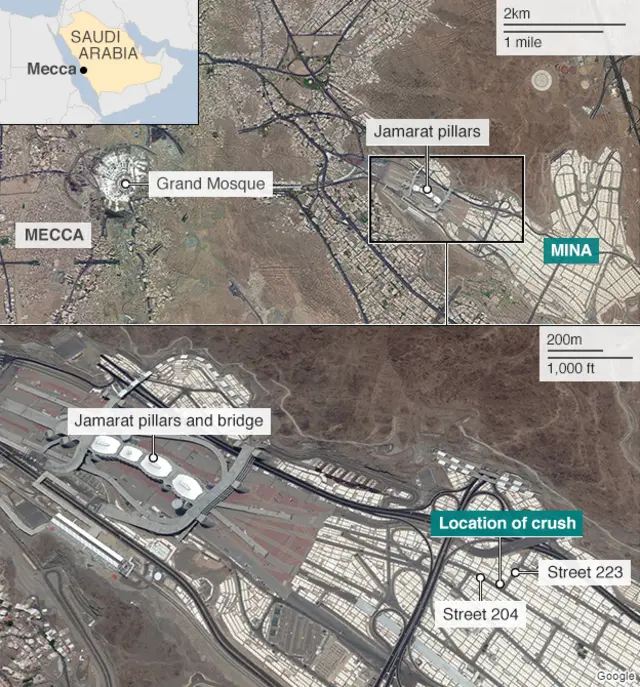
The stampede happened on a junction in Mina's tent city on the route to the Jamarat pillars
The British Foreign Office says its staff in Saudi Arabia are ready to help any Briton caught up in the stampede.
"The British embassy in Riyadh and British consulate-general in Jeddah are urgently seeking more information and stand ready to provide support to any British nationals that may have been involved," the Foreign Office said.
Taheer Zaman, a British pilgrim at the Hajj who left Mina hours before the stampede, told the BBC he could not have faulted the safety measures.
Quote MessageI have been to Mecca to carry out the Hajj a number of times over the past 20 years... In fact I have never seen so many safety precautions at the Hajj as I have seen this time... I saw a man faint in the heat and of exhaustion and 10 medical staff ran to his aid. On every escalator there are people to help those on and off. The safety precautions are more than adequate. I would go as far as to say they are over the top.
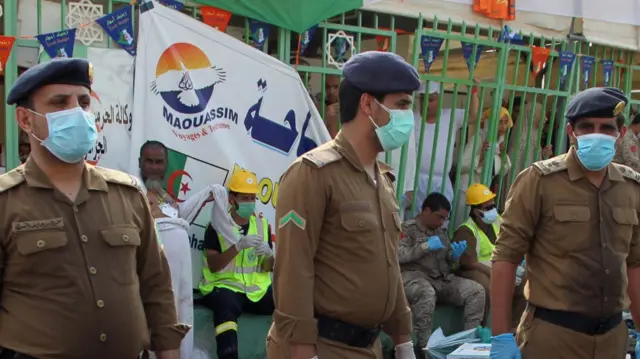 Image source, AFP
Image source, AFPSaudi police have been working alongside medical staff at the stampede
Tchima Illa Issoufou from the BBC's Hausa service was close to the scene, and told us her aunt had died in the stampede. This is what she said:
Quote MessagePeople were going towards the direction of throwing the stones while others were coming from the opposite direction. Then it became chaotic and suddenly people started going down. There were Nigerians, Nigeriens, Chadians and Senegalese among other nationals. People were just climbing on top of others in order to move to a safer place and that's how some people died. People were chanting Allah's name while others were crying, including children and infants. People fell on the ground seeking help but there was no-one to give them a helping hand. Everybody seemed to be on their own. It affected some members of our group. I lost my aunt as a result of the stampede and at the moment, two women from our entourage - a mother and her daughter - are still missing.
Similar crushes have happened before at the Hajj, though this is one of the deadliest in more than 20 years. More than 360 people lost their lives in the same area in 2006.
The Saudi authorities have spent billions of dollars over the last few years trying to improve transport and other infrastructure in the area in an attempt to try to prevent such incidents.
Preparations for this Hajj were marred when a crane collapsed at Mecca's Grand Mosque earlier this month, killing 109 people.
According to reports, Saudi Arabia's Crown Prince Muhammad Bin-Nayif has held an emergency meeting of security chiefs to investigate the causes of the stampede.
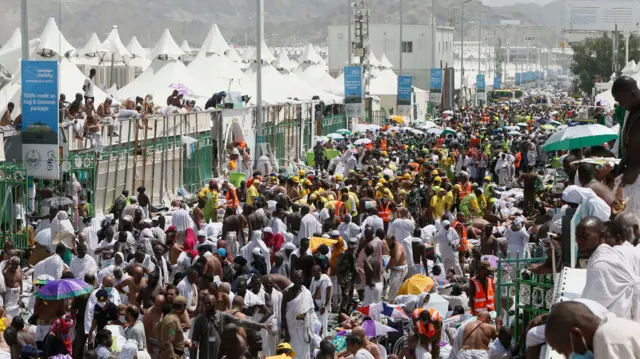 Image source, AP
Image source, APThis is a picture from the scene in Mina where people gathered to help those injured in the crush